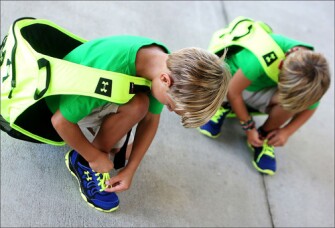
Happy Friday, Rules readers. I took a little break this afternoon to look at Full Frame’s gallery of back-to-school photos, including the colorful image above. You should probably also take a look.
The start of a new school year is a big time for school climate and student wellness efforts. Educators are establishing routines, expectations, and trust with students—all crucial elements of making children feel safe and ready to learn.
Back-to-school season is also a good time to share some links with Rules readers. This week, we read about how students ask for help, how to reduce stress by getting outside, how District of Columbia schools plan to discuss Ferguson, how to encourage good behavior in disruptive students, and more.
Dear students...
Understand that you will face people who are more insecure than you are and, therefore, they will call you names or even belittle you to make themselves feel better. Don't get angry, but feel sorry for them. Be kind to everyone, even to those who aren't kind to you. Instead of trying to be accepted by others, try to accept yourself, which will matter much more later in your life." —Educator Nicholas Ferroni in a letter to students (this was published on Huffington Post in 2012, but it's still good).
Take a stand...
The kids who would normally be slouched down, half-asleep or fidgeting in their chair were now standing up and paying attention." —Teaching Now covers research about using standing desks in schools.
Talking about Ferguson...
Sometimes students don't participate in discussions about sensitive issues because they worry that they will be teased, their opinions will be ridiculed, or strong feelings will arise because the topic hits close to home. To create a safe and supportive environment, make group agreements at the beginning of the year. Remind students that when they talk about groups of people, they should try to avoid speaking in absolutes; using the word 'some,' not 'all.'" —D.C. Public Schools created a guide for discussing Ferguson in the classroom. Many of the tips may be helpful for a range of tough conversations.
What students need to be successful...
After several home visits, we found that 10 people were living in her two-bedroom apartment, including the student's mother, who had untreated mental health issues. The little girl often got lost in the shuffle, with no clean clothes to wear and no one to track her progress. Nor was there anything like a quiet place to do homework." —Communities in Schools President Daniel J. Cardinali writes about a model for supporting students in the New York Times.
To tackle stress...
Many schools already offer stress-management programs. But they're about teaching individuals how to deal with stress instead of creating stress-reducing environments." —Teaching Now covers research about getting students outside.
More than putting out fires...
When you're in a challenging school it's easy to focus on the negatives and it takes a lot of time and energy to put out fires. But if you put that same amount of effort into rewarding students who are doing the right thing, then the kids become attracted to that. Kids want to be rewarded, so if they see kids being rewarded they're going to want to do what's necessary." —New York City Principal Shawn Rux talks about his work.
Help! I need somebody...
Help-seeking is both academic and social in nature, and adolescents are looking at their classroom as an academic and social minefield." —Sarah D. Sparks writes about how students do (and don't) ask for help.
Photo: From left, Beau and Gage Williams, 6, show a teacher how they learned how to tie their shoes over the summer as they get set for the first day of the school year at Patronis Elementary School in Panama City Beach, Fla.-Andrew Wardlow/News Herald/AP
